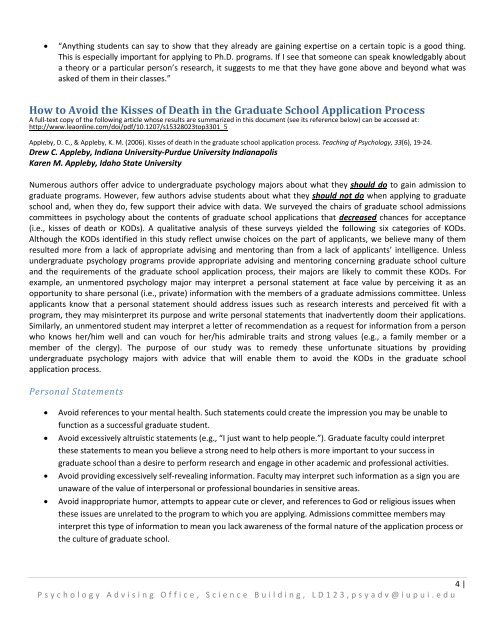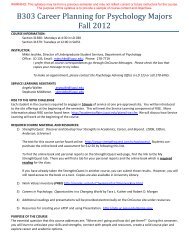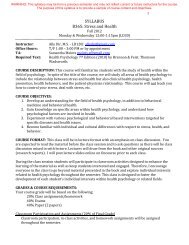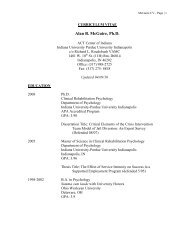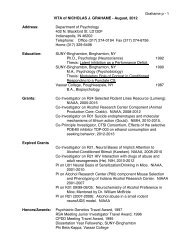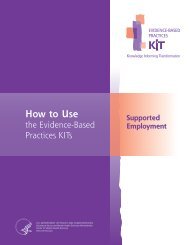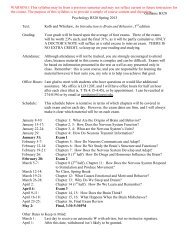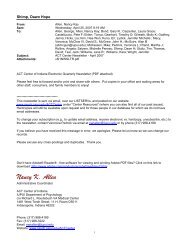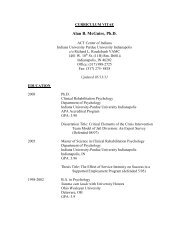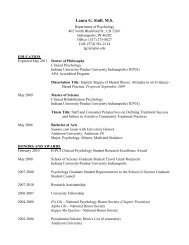Guide to Writing a Personal Statement - Psychology @ IUPUI
Guide to Writing a Personal Statement - Psychology @ IUPUI
Guide to Writing a Personal Statement - Psychology @ IUPUI
- No tags were found...
Create successful ePaper yourself
Turn your PDF publications into a flip-book with our unique Google optimized e-Paper software.
• “Anything students can say <strong>to</strong> show that they already are gaining expertise on a certain <strong>to</strong>pic is a good thing.This is especially important for applying <strong>to</strong> Ph.D. programs. If I see that someone can speak knowledgably abouta theory or a particular person’s research, it suggests <strong>to</strong> me that they have gone above and beyond what wasasked of them in their classes.”How <strong>to</strong> Avoid the Kisses of Death in the Graduate School Application ProcessA full-text copy of the following article whose results are summarized in this document (see its reference below) can be accessed at:http://www.leaonline.com/doi/pdf/10.1207/s15328023<strong>to</strong>p3301_5Appleby, D. C., & Appleby, K. M. (2006). Kisses of death in the graduate school application process. Teaching of <strong>Psychology</strong>, 33(6), 19-24.Drew C. Appleby, Indiana University-Purdue University IndianapolisKaren M. Appleby, Idaho State UniversityNumerous authors offer advice <strong>to</strong> undergraduate psychology majors about what they should do <strong>to</strong> gain admission <strong>to</strong>graduate programs. However, few authors advise students about what they should not do when applying <strong>to</strong> graduateschool and, when they do, few support their advice with data. We surveyed the chairs of graduate school admissionscommittees in psychology about the contents of graduate school applications that decreased chances for acceptance(i.e., kisses of death or KODs). A qualitative analysis of these surveys yielded the following six categories of KODs.Although the KODs identified in this study reflect unwise choices on the part of applicants, we believe many of themresulted more from a lack of appropriate advising and men<strong>to</strong>ring than from a lack of applicants’ intelligence. Unlessundergraduate psychology programs provide appropriate advising and men<strong>to</strong>ring concerning graduate school cultureand the requirements of the graduate school application process, their majors are likely <strong>to</strong> commit these KODs. Forexample, an unmen<strong>to</strong>red psychology major may interpret a personal statement at face value by perceiving it as anopportunity <strong>to</strong> share personal (i.e., private) information with the members of a graduate admissions committee. Unlessapplicants know that a personal statement should address issues such as research interests and perceived fit with aprogram, they may misinterpret its purpose and write personal statements that inadvertently doom their applications.Similarly, an unmen<strong>to</strong>red student may interpret a letter of recommendation as a request for information from a personwho knows her/him well and can vouch for her/his admirable traits and strong values (e.g., a family member or amember of the clergy). The purpose of our study was <strong>to</strong> remedy these unfortunate situations by providingundergraduate psychology majors with advice that will enable them <strong>to</strong> avoid the KODs in the graduate schoolapplication process.<strong>Personal</strong> <strong>Statement</strong>s• Avoid references <strong>to</strong> your mental health. Such statements could create the impression you may be unable <strong>to</strong>function as a successful graduate student.• Avoid excessively altruistic statements (e.g., “I just want <strong>to</strong> help people.”). Graduate faculty could interpretthese statements <strong>to</strong> mean you believe a strong need <strong>to</strong> help others is more important <strong>to</strong> your success ingraduate school than a desire <strong>to</strong> perform research and engage in other academic and professional activities.• Avoid providing excessively self-revealing information. Faculty may interpret such information as a sign you areunaware of the value of interpersonal or professional boundaries in sensitive areas.• Avoid inappropriate humor, attempts <strong>to</strong> appear cute or clever, and references <strong>to</strong> God or religious issues whenthese issues are unrelated <strong>to</strong> the program <strong>to</strong> which you are applying. Admissions committee members mayinterpret this type of information <strong>to</strong> mean you lack awareness of the formal nature of the application process orthe culture of graduate school.4 |<strong>Psychology</strong> Advising Office, Science Building, LD123,psyadv@iupui.edu


